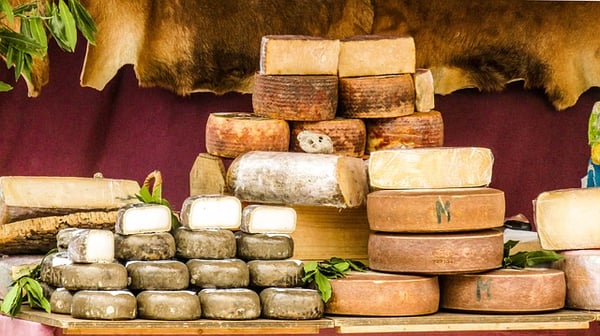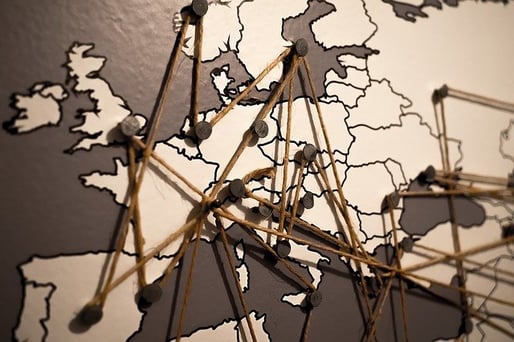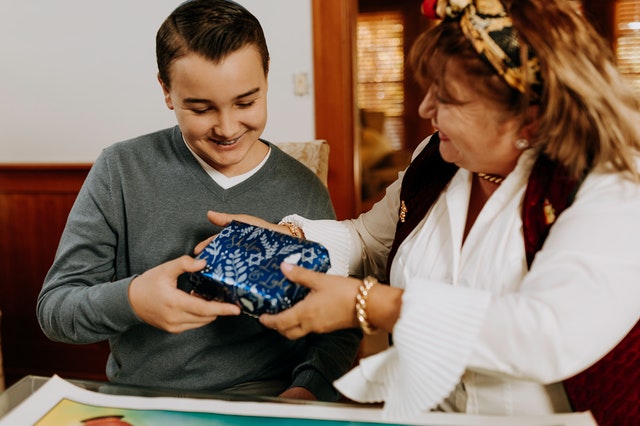Around the world gift-giving traditions vary on special occasions of all kinds. Who gives gifts to whom? When? How should a gift be wrapped - or not? How much should you spend? Can you open gifts immediately, or not?
 Gift-giving customs vary from one country to the next and offer a fun way to learn about cultural differences around the world. Within Europe we find interesting variations...
Gift-giving customs vary from one country to the next and offer a fun way to learn about cultural differences around the world. Within Europe we find interesting variations...
When is it taboo to give a gift - even back luck?
Let's compare a few European countries with each other - and with the USA.
- What can a simple gift teach us about cultural differences?
- How can other cultures teach us about our own?
- How can cultural diversity - even in gift-giving - enrich our lives?
Thank you to ICES exchange students from France, Germany, Poland, Italy and Spain for bringing our European gift-giving research to life. We love your stories, personal experiences - and advice. Please keep sharing!
Gift-Giving Customs: Taboos - watch out!
First things first: when are gifts risky business? In the USA we would think first before giving a lavish gift to a teacher or civil servant. The same goes in Europe, but there are other taboos to keep in mind as well...
 When we learn about cultural taboos we boost our Cultural Intelligence!
When we learn about cultural taboos we boost our Cultural Intelligence!
Here are just a few examples:
- Germany - it is considered bad luck to give baby gifts before the birth, so best not to organize an American-style baby shower for your German friend unless you’re 100% sure this is not an issue.
- Greece - expensive gifts can create problems because Greek culture requires the receiver to reciprocate with something of similar value.
- General - many warn against giving certain kinds of flowers, or giving any flowers in even numbers (bad luck) in some European countries. But this is an easy faux pas to avoid: buy bouquets from local florists; let the natives be your guides.
European gift-giving taboos - like those around the world - make for fun conversations, but dismal disasters. There can only be one takeaway in this category: do your homework before giving gifts in Europe (or anywhere in the world), and take advantage of cultural exchanges to talk about this intriguing topic.
Now, let's learn more about diversity in generosity!
Gift-Giving Customs: Wrap it up!
Before we dive into nitty gritty gift culture in Europe vs. USA, let’s start with the package.
One of the first things I noticed as an American living in Spain was that gifts are usually not quite as "decked out" as I was used to in the USA. Often a simple gift bag or modest - almost unassuming - wrapping paper will do.
 Gift wrap can be just one more adventure in cultural diversity.
Gift wrap can be just one more adventure in cultural diversity.
And in France? “Gifts are wrapped in a really simple way. We put a little card to say who it is from, but that’s it,” explains French student Ema on exchange in Washington State this year. Her compatriot Domitille in neighboring Oregon agrees. “We wrap our gifts with wrapping paper, nothing fancy, and sometimes ribbons.” Simple, but elegant, to be sure.
Bottom line: gift wrap in Europe is often low key compared to American packages decked out in bright papers with ribbons, decorations, balloons and more. Why might that be?
Just one more opportunity to explore different cultures...
Gift-Giving Customs: When Do You Give Gifts?
ICES students from across Europe generally agreed on many appropriate occasions to give gifts: Christmas, birthdays, weddings, births, graduation, retirement, Mother’s Day, Father’s Day, Valentine’s Day... Quite similar to the USA, it would seem.
 Christmas is big across Europe, but each country celebrates in its own way.
Christmas is big across Europe, but each country celebrates in its own way.
However, there are differences. And Europeans do not always share the same traditions for each gift-giving occasion. Just take Christmas for example. Depending on where you are in Europe, you (or your children, perhaps) could receive gifts on the following dates:
- December 6th - Saint Nicholas Day
- December 24/25 - Christmas Eve and Christmas Day
- January 1st - Saint Basil’s Day
- January 6th - Epiphany
And with so many different dates for gift-giving at Christmas, it’s best we take a closer look at which countries are giving gifts on which days of this important holiday season…
European Gift-Giving Traditions: Christmas Gifts
Just like in the USA, all across Europe, Christmas Eve and Christmas Day tend to be the center of gift-giving. But there are some important exceptions.
Saint Nicholas Day
Which European countries give children gifts on December 5th or 6th, Saint Nicholas Day? Belgium, France, Holland, Hungary, Luxembourg, Slovenia, and some parts of Italy and Germany. Elsewhere in Europe this Saint might be honoured in other ways.

Saint Basil’s Day
Did you know that in Greece people give Christmas gifts on January 1st, Saint Basil's Day? This is an elaborate Eastern Orthodox Christian holiday filled with traditions designed to bring good luck in the new year.
Epiphany
Ever imagine that in Spain, Christmas gift giving is a bit controversial? Many defend January 6th - the Epiphany - or Wisemen's Day as the proper, traditional day for giving Christmas gifts. However, Santa's fans are growing every year. Today, many families do a few gifts on Christmas Eve or Day (or both) - and then wait for the Wisemen to arrive from the East with more!
Gift-Giving Traditions: How Many Gifts?
Compared to Europeans, people in the USA generally give - and get - a lot more gifts at Christmas (and on birthdays, perhaps), even though so many families and friends are "slimming down" by drawing names. In Europe, there is a general tendency towards less gifts and more food and traditions.
 Domitille from France (far left) is exchanging Christmas culture with her host family in Oregon.
Domitille from France (far left) is exchanging Christmas culture with her host family in Oregon.
Four of our European students shared their experiences from Christmas back home...
Italy - 3 gifts?
“I usually get one gift from my sister, one from my parents, and one from my friends (they draw names)," reports Martina, an Italian student on exchange in Texas.
France - 4 gifts?
Ema usually receives around 4 gifts. On the other hand, her compatriot, Domitille looks forward to one big gift. “I usually receive multiple little gifts, and a big gift, like a phone, or a laptop,” she recalls as she prepares for her first Christmas in the USA.

Spain - Multiple gifts?
“I receive presents three times at Christmas because we celebrate multiple traditions,” says Ariadna from Catalonia. (Note: in my experience living in Spain, the overall number of gifts can be similar to France, Italy and other European countries.)
How many gifts are normal for a Christmas celebration? Ask the Europeans in your life and explore different formulas for gift-giving.
European Gift-Giving Customs: Weddings, Births and Birthdays...
European culture can be deceiving for US Americans: we share so many things that it's easy to assume we do things in exactly the same way. Let's activate our curiosity by considering some differences in Europe:
Weddings in Europe
It's quite common to give money instead of actual gifts in Germany, France, Italy and Spain - according to this year's ICES exchange students. Gifts can be an option, and in Germany, for example, exchange student Juliana explains that some people create a website with a gift list.
Bottom line? Consider consulting native guides before bringing an actual gift to a wedding in any European country...
 In some European countries it's more common to give money than an actual wedding gift.
In some European countries it's more common to give money than an actual wedding gift.
Birthdays in Europe
Just like in the USA, birthdays are an important gift-giving occasion. In countries across Europe, birthdays are celebrated with family, friends - and, of course - gifts.
Births in Europe
Let's remember the German taboo that prohibits giving gifts before a baby is born. New babies generate gifts in European countries, but American-style baby showers are just that: American. In Spain, gifts also tend to come after the birth. And traditional favorites are handmade sweaters/blankets and hand embroidered bibs.
Europe: Other Gift-Giving Occasions...
As we move through Europe it's a good idea to be on the lookout for other gift-giving occasions that might be less common - or non-existent - in the USA. For example...
Saint Days
In some parts of Europe people celebrate their Saint Day - or "Name Day". This is the case in Spain, and as Ariadna from Catalonia explains, "We receive small presents (books, for example) for our Saint Day. For example if your name is Mary, your saint is going to be the they of the Virgin Mary."
 Name days are celebrated in countries like Spain with a greeting and possibly a little gift.
Name days are celebrated in countries like Spain with a greeting and possibly a little gift.
Hogmanay
In Scotland, December 31st is known as Hogmanay and requires people to visit one another and step over the threshold into the home with gifts (traditionally food) for good luck.
Witch Day
This is actually the Epiphany (January 6), but as Martina from Italy explains, an old hag, known as Befana, slips into homes at night to leave children gifts - or lumps of coal (if they were bad).

Love Day
"April 23, is the love day in Catalonia," says Ariadna, who is sharing her culture with a host family in Oregon this year. "Women receive a book and a rose. Men just get a book. You usually receive roses from men in your family or boys who like you."
Gift-Giving Customs: What Should We Give?
In every country, around the world, people grapple with The Question: "What should we give?" The answer is personal, but does culture play a role? Let's see. We asked our exchange students to recall a favorite gift:
- "A pair of shoes that I love." Ona (Spain)
- "My dog Trac." Nuria (Catalonia)
- "An angel necklace" (Representing a deceased family member who will watch over you.) Martina (Italy)
- "A ticket to a concert that I thought was sold out." Ema (France)
 Nuria (second from left) from Catalonia enjoys her Michigan host family's custom of making homemade Christmas gifts for each other.
Nuria (second from left) from Catalonia enjoys her Michigan host family's custom of making homemade Christmas gifts for each other.
In cultures around the world, people value carefully chosen, thoughtful gifts that have special meaning. But there are national trends too:
- Belgians like giving fine quality chocolates (Belgian, of course).
- French are known for giving perfume and wine.
- Spaniards love to gift their cheeses, cured meats and wines.

Gift-giving customs are a source of endless conversations - and that is what cultural exchange is all about!
Gift-Giving Culture Shocks!
Be advised that gift-giving is a perfect opportunity to give and receive culture shocks too. What? These can be gifts that make sense in one culture, but not another. For example, most Americans relish the thought of a box of Belgian chocolates, but not everyone in the USA is prepared to savor the strongest aged cheeses from countries like Denmark, France or Spain...

And there are shocking gift-giving traditions to be explored as well. Here are just two examples from Spain and Germany:
The Catalonian "Gift Log"
This is a rather shocking tradition to outsiders. We'll let Ana from Catalonia explain, “On Christmas Eve, we celebrate the "Tió". This is a “gift-giving log” that has to be “fed” until Christmas Eve.” Then, the whole extended family meets to sing carols and hit the log with a stick until it “poops” presents, traditionally, honey, nuts and desserts like turron. Nowadays, the log also produces everything from toys to electronic devices, according to Ana.
 This year Ona shared her Catalonian Christmas culture with her host family in Michigan with an authentic "Tió" Gift Log under the Christmas tree ready to "poop" presents.
This year Ona shared her Catalonian Christmas culture with her host family in Michigan with an authentic "Tió" Gift Log under the Christmas tree ready to "poop" presents.
The German Gift of a Good Coat of Flour
According to Liliana from Germany, this is a fact - at least in her town. "On your 16th birthday, your friends are allowed to pour flour over your head before school. Then you have to go to school completely white." The gift of an unforgettable experience?
 Liliana from Germany is sharing Christmas traditions with her host family in Illinois this year.
Liliana from Germany is sharing Christmas traditions with her host family in Illinois this year.
Gift-Giving Customs Around the World... Next stop?
Giving and receiving gifts (reciprocity) appears to be a universal human activity, but in every culture, people have different ways of doing it. Europe is a fun place to begin exploring cultural differences. And just think: despite the many historical ties we share, there's still so much to learn.

But what about the rest of the world? Who are the foreigners in your life? What countries are they from? What would you love to know about their gift-giving cultures?
Why not just ask? Get the gift of cultural diversity: new ideas that enrich your life!


